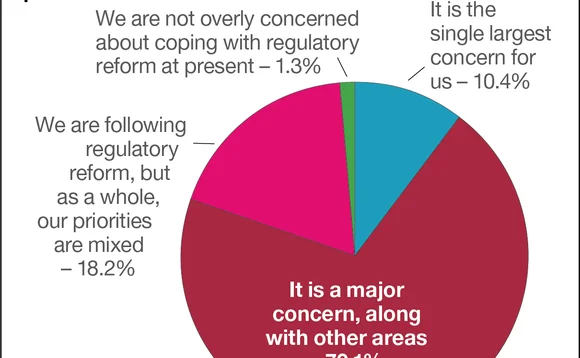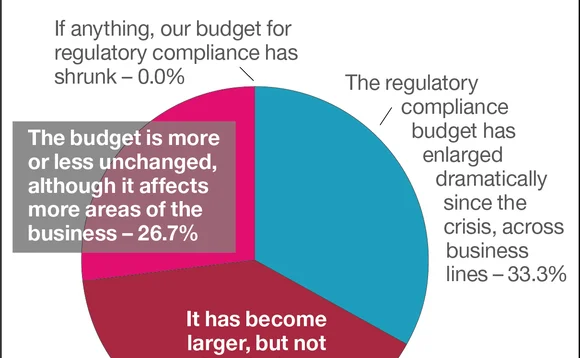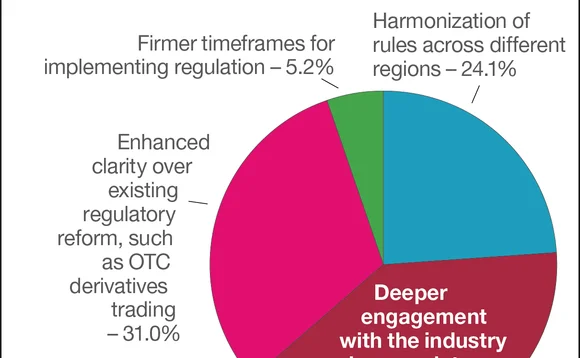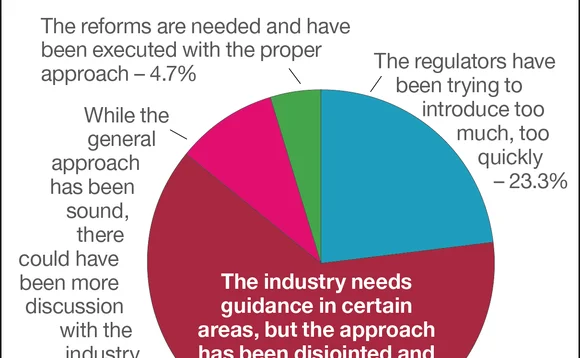Regulation Webcast: Risk and Reward




Green says, however, that regulatory initiatives around central clearing had concentrated elements of risk from a distributed basis among financial institutions to a few single points in the system, namely the central counterparties that act as intermediaries between trades.
On another positive note, AxiomSL’s Royan says that much of the information and data now being demanded by regulators is actually useful in the business, and posits that even if regulations around reporting requirements are relaxed, some banks might consider preserving the process.
“Regarding this information that the regulators are requiring, many banks are looking at it now and realizing that they should have been looking at it from the start, and using those reports,” he says, highlighting enhanced data regarding liquidity as a particularly beneficial development. “Even if the regulators remove the requirements for some of these reports in the future, you might see a lot of people hanging on to them, because they’ve actually become a means through which management decisions are now being driven.
Arbitrage
Although reform is taking place across the world, the pace and regulatory approaches are fragmented. Broadly similar regimes exist across Europe and the US, but in Asia the landscape has a lack of uniformity that leads to questions of regulatory arbitrage. The panelists say that the rules are coalescing slowly, though, and while extraterritoriality is a concern, there is a general agreement that arbitrage opportunities are likely to be slim, again driven by technology upgrades.
“There’s already plenty of anecdotal evidence to suggest that activities in the US around Dodd–Frank, or EMEA around Mifid, are promoting a shift of business to Asia,” says Nasdaq OMX’s Nosal. “We see that these anecdotes are complemented by an uptick in the inquiries from new and existing customers for more rigorous market surveillance for firms trading out of Asia-Pacific. So it may be that, as with most arbitrage situations, the opportunity will be short-lived.”
RBS’ Eddie says he concurs, also raising the point that rule substitution—where compliance in one region could be used as a basis for compliance in another with analogous regulation—could be useful to international firms such as his. From his perspective, Crédit Agricole’s Green says that growing knowledge of incoming regulation and its increasing coordination was already addressing some of these issues.
“Obviously, regulatory arbitrage is a concern, and there is a window. As [RBS’ Eddie] says, it’s one that may not be open for long, but it is there now,” he says. “The interesting thing is that a lot of the concerns that we have about regulations, as we become more familiar with them, turn out to be less so than we anticipated. The advantage of an area being outside of the regulations becomes less than we initially feared—not necessarily just the difference in the regulations, and therefore the opportunity for arbitrage, but actually the incentive to capitalize on it could be diminished.”
Only users who have a paid subscription or are part of a corporate subscription are able to print or copy content.
To access these options, along with all other subscription benefits, please contact info@waterstechnology.com or view our subscription options here: https://subscriptions.waterstechnology.com/subscribe
You are currently unable to print this content. Please contact info@waterstechnology.com to find out more.
You are currently unable to copy this content. Please contact info@waterstechnology.com to find out more.
Copyright Infopro Digital Limited. All rights reserved.
As outlined in our terms and conditions, https://www.infopro-digital.com/terms-and-conditions/subscriptions/ (point 2.4), printing is limited to a single copy.
If you would like to purchase additional rights please email info@waterstechnology.com
Copyright Infopro Digital Limited. All rights reserved.
You may share this content using our article tools. As outlined in our terms and conditions, https://www.infopro-digital.com/terms-and-conditions/subscriptions/ (clause 2.4), an Authorised User may only make one copy of the materials for their own personal use. You must also comply with the restrictions in clause 2.5.
If you would like to purchase additional rights please email info@waterstechnology.com
More on Regulation
Esma won’t soften regulatory expectations for cloud and AI
CCP supervisory chair signals heightened scrutiny of third-party risk and operational resilience.
Esma supervision proposals ensnare Bloomberg and Tradeweb
Derivatives and bonds venues would become subject to centralized supervision if the proposed reforms go through.
Cyber insurance premiums dropped unexpectedly in 2025
Competition among carriers drives down premiums, despite increasing frequency and severity of attacks.
Market participants voice concerns as landmark EU AI Act deadline approaches
Come August, the EU’s AI Act will start to sink its teeth into Europe. Despite the short window, financial firms are still wondering how best to comply.
ICE to seek tokenization approval from SEC under existing federal laws
CEO Jeff Sprecher says the new NYSE tokenization initiative is not dependent on the passage of the US Clarity Act.
Why UPIs could spell goodbye for OTC-Isins
Critics warn UK will miss opportunity to simplify transaction reporting if it spurns UPI.
Re-examining Big Tech’s influence over the capital markets
Waters Wrap: A few years ago, it seemed the big cloud providers were positioning themselves to dominate the capital markets tech scene. And then came ChatGPT.
Pressure mounts on Asia to fall in line for T+1
With the US already on a T+1 settlement cycle, and the UK and EU preparing for the shift in 2027, there’s pressure for Asia to follow suit. But moving may involve more risks than expected.







